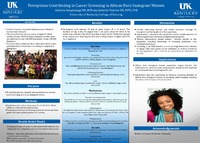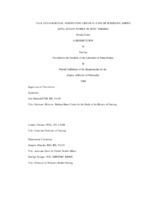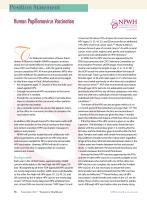| dc.contributor.author | Adegboyega, Adebola | en |
| dc.contributor.author | Hatcher, Jennifer | en |
| dc.date.accessioned | 2016-03-17T13:02:17Z | |
| dc.date.available | 2016-03-17T13:02:17Z | |
| dc.date.issued | 2016-03-17 | |
| dc.identifier | INRC15PST406 | |
| dc.identifier.uri | http://hdl.handle.net/10755/602040 | |
| dc.description | <p>Research Congress 2015 Theme: Question Locally, Engage Regionally, Apply Globally. Held at the Puerto Rico Convention Center.</p> | en |
| dc.description.abstract | <p>Session presented on Sunday, July 26, 2015:</p>
<p><strong>Purpose:</strong> Disparities in cervical cancer screenings exist for foreign born women in the United States (Hurtado-de-Mendoza, Song, Kigen, Jennings, Nwabukwu, and Sheppard (2014). Immigrants have lower screening rates compared to non-immigrant population in the United States (Harcourt, Ghebre, Whembolua, Zhang, Osman and Okuyemi (2014) despite availability of screening test which allows for detection and treatment of precancerous lesions. African migrants represent one of the fastest growing groups of immigrants to the United States. However, there is a scarcity of information about the attitudes and barriers contributing to preventive healthcare practices of African migrants in the United States. This study sought to have an in-depth understanding of perceptions contributing to cervical cancer screening practices in African immigrants in Kentucky and to explore the barriers experienced by this population in utilizing cervical cancer screening.</p>
<p><strong>Methods:</strong> This is a qualitative descriptive study. The health belief model was used as the conceptual underpinning for this study. The study participants were females self-identified as African born, aged 18 years and above, English speaking who have lived in the US for more than one year. The women were recruited through African churches and by words of mouth after approval was received from the University of Kentucky Institutional Review Board. Data were gathered through in-depth focus group sessions and socio-demographic questionnaires. The interview sessions were digitally recorded and transcribed verbatim. Transcripts were analyzed to identify emerging themes.</p>
<p><strong>Results:</strong> 22 women aged 24-65 years were interviewed during focus group. Duration of stay in the US ranged from 2- 26 years. The major barriers to screening utilization identified by participants included low knowledge of cervical cancer screening, cost, language and communication problem, and low priority on health to-do list. Even though, many participants are not up to date on screening, they belief that they are susceptible to cervical cancer and screening may be beneficial for early detection and treatment outcome.</p>
<p><strong>Conclusions:</strong> Participants identified numerous barriers to screening utilization and have intention to screen if these barriers can be alleviated. Participants suggested that subsidized cost of screening, increased awareness, provider's recommendations and reminders will be helpful in adherence to screening recommendations. Implication for practice: To increase utilization among African migrant women there should be improved grassroots awareness programs in a culturally sensitive manner. Providers have the opportunity to influence screening attitudes of African born women by providing patient targeted sensitive education and cues to action. Global implication: Improved cervical cancer screening will lead to early detection and improved treatment outcome, which will decrease the global cervical cancer burden.</p> | en |
| dc.format | Text-based Document | en |
| dc.language.iso | en | en |
| dc.subject | Cervical Cancer | en |
| dc.subject | Screening | en |
| dc.subject | African Immigrants | en |
| dc.title | Perceptions contributing to cervical cancer screening decisions in African born immigrant women | en |
| dc.type | Poster | en |
| dc.rights.holder | <p>
All rights reserved by the author(s) and/or publisher(s) listed in this item record unless relinquished in whole or part by a rights notation or a Creative Commons License present in this item record.
</p><p>
All permission requests should be directed accordingly and not to the Sigma Repository.
</p><p>
All submitting authors or publishers have affirmed that when using material in their work where they do not own copyright, they have obtained permission of the copyright holder prior to submission and the rights holder has been acknowledged as necessary.
</p> | en |
| dc.description.note | <p>Items submitted to a conference/event were evaluated/peer-reviewed at the time of abstract submission to the event. No other peer-review was provided prior to submission to the Henderson Repository.</p> | |
| dc.type.category | Full-text | en |
| dc.evidence.level | N/A | en |
| dc.research.approach | N/A | en |
| dc.subject.cinahl | Help Seeking Behavior--Evaluation | en |
| dc.subject.cinahl | Cervical Smears | en |
| dc.subject.cinahl | Cervix Neoplasms--Prevention and Control | en |
| dc.subject.cinahl | Immigrants--Psychosocial Factors | en |
| dc.contributor.department | Delta Psi at-Large | en |
| dc.author.details | Adebola Adegboyega, RN; Jennifer Hatcher, RN | en |
| dc.conference.name | 26th international Nursing Research Congress | en |
| dc.conference.host | Sigma Theta Tau international | en |
| dc.conference.location | San Juan, Puerto Rico | en |
| dc.date.conferenceyear | 2015 | |
| dc.description.reviewtype | Abstract Review Only: Reviewed by Event Host | en |
| dc.description.acquisition | Proxy-submission | en |





